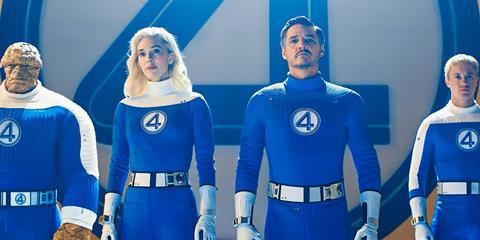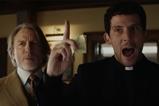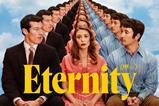Fantastic Four: First Steps leans into the domestic family dynamics as well as the heroics. It is a combination that feels perfectly balanced and for viewers with faith, Giles Gough says there’s an extra layer of biblical parallels woven into the film

Much like Superman, Fantastic Four: First Steps is mercifully not an origin story.
The film begins a solid four years after the space flight that granted them their super-powers. For those not in the know, their origins are dealt with in a short montage of newsreel footage early on.
Johnny Storm (Joseph Quinn) is the Human Torch, younger brother to Sue Storm (Vanessa Kirby) aka Invisible Woman, who is already married to Reed Richards (Pedro Pascal), humbly known as Mr Fantastic.
Rounding out Marvel’s First Family is Reed’s best friend Ben Grimm, (Ebon Moss-Bachrach) better known as the ever-lovin’ blue-eyed Thing.
The Fantastic Four are beloved by the public, defeating super-villains with grace and ease. That is until the arrival of a sinister, over-powering threat, namely, Galactus, a villain that has a distinctly Old Testament vibe to him.
What did Stan believe?
Stan Lee, the co-creator of the Fantastic Four was of Jewish-Romanian heritage. His views on God don’t fit neatly into any one box.
His words on the subject sometimes indicate atheism, sometimes agnosticism, and sometimes something else entirely.
Writer and long-term friend of Stan’s, Jim McLauchlin told Indiewire that Stan “loved to quote Omar Khayyám’s Rubaiyat line, ‘Did the hand then of the potter shake?’ To Stan, it meant that just as the hand of a potter could make an imperfect jug because the potter is flawed, so too is God flawed in his creation of an imperfect man… Stan believed in God, but thoroughly enjoyed the notion that God was far from perfect.”
Galactus – an uncaring god
As this is not in keeping with either Christian or Jewish beliefs, it might impact how Stan created god-like beings like Galactus.
Galactus has decided that Earth is marked for death and he’s going to destroy it. That has a clear parallel to the God of the Old Testament flooding the earth, or destroying Sodom and Gomorrah.
These are stories that Stan no doubt would have been very familiar with.
So a character like Galactus does look how someone who is sceptical of God might see him; merciless, uncaring and with a silly hat thrown in for good measure.
The Silver Surfer – a problematic saviour
While the plot of this film is relatively straight forward, the characterisation is exceptionally deep. The Silver Surfer (Julia Garner) looks distinctly more female than casual fans might expect, but her tragic backstory is much the same as her male counterpart’s.
Forced into an impossible situation, the Silver Surfer becomes the herald of Galactus in exchange for him sparing her planet.
If it ended there, it would be a nice, neat messiah parallel. But unfortunately, it then becomes the Silver Surfer’s job to choose the planets that Galactus will devour. She is at best a problematic, yet tragic saviour, who thankfully finds her redemption before the credits roll.
The team themselves are delightfully realised. Joseph Quinn’s Johnny Storm is a revelation. He’s still the cheeky, irreverent member of the team. But this interpretation sees Johnny as hyper-competent, intelligent, and not afraid of self-sacrifice.
Pedro Pascal and Vanessa Kirby are pitch perfect as Sue Storm and Reed Richards, the married couple at the heart of the team.
Kirby’s Sue understands, without judgement, that her husband is the person who invites terrible thoughts into his mind, in order to work out how to defeat them.
Even in the heightened circumstances, they are both an overwhelmingly positive depiction of marriage and new parenthood.
Marvel’s Jewish superhero
Lastly, Ben Grimm ‘The Thing’ is a hugely comforting presence.
Though not originally written as such, Grimm is canonically Jewish, and thought to be inspired by original penciller, Jack Kirby. Arguably Marvel Comics’ most prominent Jewish character, it’s refreshing to see The Thing’s cultural background foregrounded in this film.
Along with the Hulk, The Thing is possibly one of earliest examples in pop-culture of a character who looks monstrous, but is actually noble and heroic.
He’s an exemplary reminder of 1 Samuel 16:7 - “Truly, God does not see what man sees, for man looks at the outward appearance, but the Lord sees the heart.”
Ebon Moss-Bachrach plays him with humility, perceptiveness and wry humour.
The pacing can at times feel a bit breathless, and whilst CGI has advanced to the point where an orange rock monster looks completely believable, the CGI baby Franklin still doesn’t feel quite right.
The story takes place in a New York bedecked in a retro-futuristic style. The set design alone is a love letter to the optimistic vision of the future we so often saw in 1960s sci-fi.
This is a world where the Fantastic Four are the only super-heroes, something we haven’t seen in a long time. This does make the plot very lean, an ideal film to take someone who might be unfamiliar with the superhero genre.
As this is the start of a new phase for the Marvel Cinematic Universe, Fantastic Four: First Steps kicks off phase six with a bang. Director Matt Shakman (who also directed the superlative WandaVision for Disney+) seems to know something that previous directors do not.
You don’t need to goof up, or darken down the Fantastic Four. You can trust the source material to welcome you into the family and take you along for the ride.







































1 Reader's comment